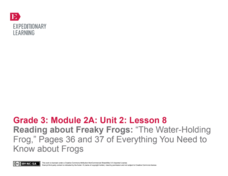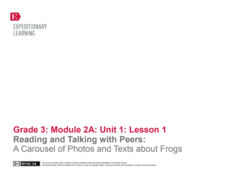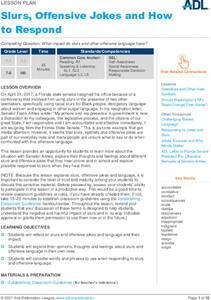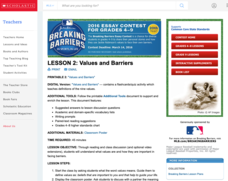EngageNY
Getting the Gist: Steve Jobs Commencement Address (Focus on Paragraphs 6-8, and connecting to Chapter 6)
As part of a unit study of Bud, Not Buddy, readers compare Buddy's list of rules to live by with those that Steve Jobs enumerates in his commencement address to Stanford's 2005 graduating class.
EngageNY
Reading about Freaky Frogs: “The Water-Holding Frog"
Boost reading comprehension skills with a lesson plan all about freaky frogs. A poem hooks scholars and takes them into a reading of an informational text followed by peer discussions. A three-page worksheet focuses on text features and...
EngageNY
Continued Close Reading of Waiting for the Biblioburro: Comparing and Contrasting the Children in Colombia, Appalachia, Chad, and Afghanistan
Focus on similarities and differences with a jigsaw activity that requires pupils to compare Waiting for the Biblioburro to other texts they have read. To prepare, class members first respond to text-dependent questions, moving on to...
EngageNY
Reading and Talking with Peers: A Carousel of Photos and Texts about Frogs
Frogs are the theme of a lesson plan that challenges scholars to examine photographs, read informational texts, then ask and answer questions. Scholars work collaboratelively as they rotate through stations, discuss their observations,...
EngageNY
Reading for Gist and Answering Text-Dependent Questions: Industrial Food Chain
Where do humans fall on the food chain? Scholars read about the Industrial Food Chain in The Omnivore’s Dilemma sections. They use word catchers to record unfamiliar words as they read and place sticky notes in the margins to annotate...
EngageNY
Getting to Know Esperanza (Chapter 2: “Las Uvas/Grapes”)
Delve into Esperanza Rising by Pam Muñoz Ryan with close reading and evidence-based, text-dependent questions. Part of a unit series, this well-sequenced, Common Core designed instructional activity draws on material from the previous...
National Woman's History Museum
Defying British Rule: Women's Contributions to The American Revolution
Primary and secondary sources are the focus of a instructional activity that showcases the important role women played during the American Revolution. Pairs review sources and discuss their findings. A close-reading of an informational...
EngageNY
Reading for Gist and Answering Text-Dependent Questions: Local Sustainable Food Chain
Readers use sticky notes and a Reading Closely: Guiding Questions handout to record the gist of a different section (pages 161-166) in The Omnivore’s Dilemma. They then pair up and share their ideas. To end the lesson, readers complete...
Curated OER
Responding to Literature: James and the Giant Peach
Fifth grade reader/writers create an alternate ending to an episode in Roald Dahl's James and the Giant Peach in which our protagonist "loses" the chance to magically solve all his problems. Prompts students not only to write creatively...
Teach It Primary
The Pied Piper of Hamelin
Six tasks make up a lesson plan designed to reinforce comprehension and language skills using the poem "The Pied Piper" by Robert Browing. Scholars discuss and define unknown words, identify adjectives and onomatopoeia, review complex...
Curated OER
Baseball Saved Us Teacher’s Guide
Young scholars read the book "Baseball Saved Us" and respond to the story through writing activities. In this reading lesson, students create a chart of events which they predict will take place in the story. Young scholars then use...
Curated OER
Call of the Wild: After-reading Response Strategy
Readers select a character from Call of the Wild, record their responses to a series of prompts in a spiral notebook, and use details from the novel to support their thinking. The spirals are then used as source material to support a...
EngageNY
Inferring About Characters Based on How They Respond to Challenges (Chapter 4: "Los Higos/Figs")
How do you know what a character's personality is like if an author doesn't tell you? With a focus on character development in Esperanza Rising, pupils complete a jigsaw activity to analyze the actions of Mama, Abuelita, and Miguel. Once...
Anti-Defamation League
Slurs, Offensive Jokes and How to Respond
How to respond to slurs and offensive jokes is the topic of a lesson designed for middle and high schoolers. After journaling about their experiences with slurs and nasty jokes, participants read an article about a Florida State Senator...
Urban Ministry
Interactive Read Aloud
Learning how to deliver good literacy instruction is key to becoming a successful teacher. This resource isn't so much a lesson as it is a guide to leading children in an interactive read-aloud session to increase fluency, comprehension,...
EngageNY
End of Unit 1 Assessment: Analyzing an Excerpt from Barack Obama’s Back-to-School Speech
In order to assess their mastery of the concepts taught in a 12-lesson plan unit study of Christopher Paul Curtis' Bud, Not Buddy, individuals read excerpts from President Barack Obama's 2009 Back-to-School Speech and use the strategies...
Curated OER
Travels With Charley By John Steinbeck
A paragraph from John Steinbeck's Travels with Charley provides English language learners with an opportunity to practice strategies for answering guiding questions about the academic text. Class members locate keywords in the annotated...
US Institute of Peace
Responding to Conflict: Nonverbal Communication
What does your posture say about you? How can it affect the outcome of conflict resolution or negotiation? Show scholars the importance of nonverbal communication during the sixth in a series of 15 peacebuilding lessons. Learners work...
Facing History and Ourselves
Responding to Difference in Democracy
Disagreements happen in a diverse democracy. It's what people do about these differences in a diverse society that the resource models. After listening to an eight-minute podcast about a woman who collaborated with people who have very...
Illustrative Mathematics
Making a Clock
Have a fun time teaching children to read analog clocks with this whole-group math activity. Using large sets of the numerals 1-12 and 0, 5, 10...55, the teacher creates a large clock on either the carpet or the white board, explaining...
John F. Kennedy Presidential Library & Museum
Analyzing the Inaugural Address
Get high school historians to step outside their own shoes by responding to JFK's inaugural address from the perspective of a civil rights activist, a soviet diplomat, or a Cuban exile. After a class discussion about the address, the...
Novelinks
The True Confessions of Charlotte Doyle: Magic Square Vocabulary
After reading chapter one of The True Confessions of Charlotte Doyle by Avi, take part in a magic square vocabulary activity in which scholars match the term with its definition and insert its corresponding number in to the magic square...
Scholastic
Drones Take Off
Ever wonder what drones are doing high above us in the sky? This article gives your class an insight to what those robots in the sky are doing. After reading an article on drone technology, pupils are prompted to respond to a variety of...
Scholastic
Lesson 2: Values and Barriers
Scholars investigate and discuss the importance of values and how they can be used to break barriers. Small groups work collaboratively to examine the text and draw inferences to answer questions. A writing assignment challenges pupils...
Other popular searches
- Independent Reading Response
- Reading Responses
- Reading Open Response
- Reading Responses Nonfiction
- Written Response to Reading
- Response to Reading
- Reading Extended Responses
- Reading, Extended Response
- Reading Responses or Logs
- Reading Responses Templates
- Improve Reading Responses
- Reading Open Ended Responses

























